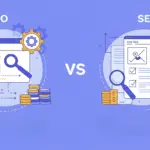Did you know? Businesses that leverage AI-driven marketing strategies see up to 25% higher conversion rates and significantly improved customer engagement.
Today’s customers expect more than just generic advertisements and mass-produced content. They demand personalized experiences, instant responses, and marketing that speaks directly to their needs. This shift in consumer expectations has paved the way for artificial intelligence (AI) to revolutionize the marketing industry.
Advanced machine learning algorithms analyze user behavior in real time, allowing businesses to deliver hyper-personalized experiences, optimize ad targeting, and improve customer engagement like never before. The result? Higher conversion rates, increased customer loyalty, and a competitive edge in the digital space. This ultimate guide will uncover the latest AI trends shaping digital marketing in 2025 and show you how to implement them to outperform the competition.
What is AI in Digital Marketing?
AI in digital marketing refers to the application of artificial intelligence technologies to enhance marketing strategies and operations. This includes utilizing AI algorithms and machine learning to automate tasks, analyze consumer behavior, and optimize marketing campaigns effectively. AI tools play a vital role in personalizing content and predicting customer actions, allowing marketers to tailor their approaches for maximum engagement.
AI digital marketing solutions range from chatbots that provide instant customer service to predictive analytics that forecast market trends. AI also assists in understanding consumer sentiment by analyzing social media conversations and online reviews. With these AI-driven insights, brands can fine-tune their marketing efforts, ensuring that their campaigns resonate with their target audience and yield better ROI.
The Role of AI in Digital Marketing
AI in digital marketing isn’t just about chatbots and automation—it’s reshaping how brands interact with consumers. From analyzing consumer behavior to optimizing marketing campaigns, AI tools powered by machine learning and natural language processing (NLP) are refining the approach of a digital marketing strategy. Here’s how AI is making an impact:
- Data-Driven Decision-Making:
AI algorithms process vast amounts of data in real time, helping marketers make data-backed decisions. Instead of relying on intuition or outdated market trends, AI-driven insights enable businesses to optimize their marketing strategies based on real-time performance metrics, audience preferences, and emerging market trends.
By analyzing customer behavior, AI helps marketers understand what works and what doesn’t, allowing them to adjust campaigns dynamically. This reduces guesswork and enhances precision in digital marketing strategies, ensuring better outcomes and increased ROI.
- Personalization at Scale:
AI-powered content recommendations and targeted advertising enhance user experience and engagement by delivering relevant content to the right audience. Consumers are more likely to interact with brands that understand their needs and preferences. AI-driven personalization goes beyond basic demographic segmentation and incorporates behavioral data, previous interactions, and purchase history to curate highly relevant and engaging experiences for each user.
From personalized email marketing campaigns to dynamic website content that adapts to user preferences, AI allows brands to establish deeper connections with their audience, fostering loyalty and increasing conversion rates.
- Automation & Efficiency:
Marketing teams often deal with repetitive tasks such as email marketing, social media posting, and lead nurturing. AI-driven automation tools streamline these processes, freeing up time for creative strategy and execution.
By automating tasks such as customer segmentation, email responses, and content scheduling, marketers can focus on high-impact activities like campaign ideation and storytelling. AI-driven automation ensures consistency in marketing efforts while optimizing efficiency and reducing manual workload.
- Predictive Analytics:
AI-driven predictive analytics leverage historical data and machine learning algorithms to forecast future trends, customer behaviors, and market dynamics. This enables businesses to stay ahead of market shifts and proactively adapt their strategies.
For instance, AI can predict customer churn, helping businesses implement retention strategies before losing valuable customers. AI-powered forecasting also optimizes ad spending, ensuring maximum efficiency and return on marketing investments.
Ready to revolutionize your marketing with AI? Let Ascend Spark help you integrate AI-driven strategies that personalize, automate, and scale your brand’s success. Contact us now!
Key AI Trends in Digital Marketing for 2025
1. AI-Generated Content: Quality at Scale
AI-generated content is no longer experimental; it’s an essential tool for scaling content marketing. AI tools powered by natural language processing (NLP) can create blog posts, ad copy, and social media updates that mimic human writing. These AI-generated materials help brands maintain a consistent online presence without requiring extensive manual effort.
However, human oversight remains crucial to ensure quality, brand consistency, and originality. AI should be used as an aid rather than a replacement for human creativity. Marketers should review, refine, and personalize AI-generated content to ensure it aligns with brand values and resonates with the audience.
2. Hyper-Personalization: Beyond Demographics
Hyper-personalization takes AI-driven marketing to the next level by analyzing browsing history, past purchases, and engagement patterns to create uniquely tailored experiences. AI algorithms now go beyond demographic targeting, using behavioral data and real-time insights to personalize interactions.
Expect AI-driven personalization to move beyond emails and into dynamic website content, AI-powered product recommendations, and real-time chatbot interactions. The more personalized the experience, the higher the engagement and conversion rates.
3. Intelligent Chatbots: The New Customer Service Frontier
AI-driven chatbots are evolving to handle complex customer queries through advanced NLP capabilities. These intelligent chatbots can provide instant responses, resolve customer issues, and even guide users through the sales funnel.
By integrating chatbots with voice assistants like Siri and Alexa, businesses can enhance customer support and lead generation strategies. Conversational AI is expected to become an integral part of customer service, replacing traditional support channels and improving customer satisfaction.
4. AI-Powered SEO: Smarter Search Optimization
Search engines are increasingly relying on AI and machine learning, which means digital marketers must adapt their SEO strategies accordingly. AI tools can assist in real-time keyword analysis, content recommendations, and search intent optimization.
Google’s AI-driven updates prioritize user experience, meaning AI-powered SEO strategies must focus on high-quality content, mobile optimization, and intent-based search queries. Marketers must leverage AI tools like Clearscope and SurferSEO to stay ahead of search engine algorithm changes.
Stay ahead with AI-driven marketing! Reach out to Ascend Spark and discover how AI can optimize your campaigns, enhance customer experiences, and maximize conversions. Let’s talk!
5. Precision Advertising
AI-driven ad platforms analyze consumer behavior in real time, optimizing ad placements and bid strategies for better conversion rates. AI automation ensures that ads reach the most relevant audiences at the right time, improving campaign performance.
Advanced AI algorithms can also generate ad creatives based on engagement data, ensuring that the most effective ad variations are shown to the right users, maximizing ROI on ad spend.
6. AI and Predictive Analytics for Smarter Decision-Making
AI in digital marketing is moving towards predictive analytics, where machine learning models forecast trends and consumer behavior. This empowers agencies to make proactive decisions, allocate budgets efficiently, and craft more effective campaigns before launching them.
Predictive analytics ensures that businesses stay ahead of consumer trends rather than reacting to them after the fact, giving them a competitive edge in the marketplace.
7. AI and Voice Search Optimization
With the rise of voice search, AI algorithms are refining how content is optimized for spoken queries. Businesses need to prioritize conversational keywords, long-tail phrases, and AI-powered voice search optimization strategies to remain competitive.
By optimizing for natural language search queries, brands can ensure that their content ranks well in voice search results, improving visibility and accessibility.
8. AI-Driven Social Media Marketing
AI-powered tools enhance social media marketing by analyzing engagement data, automating content posting, and optimizing influencer partnerships. AI-driven sentiment analysis helps brands respond in real time, improving online reputation management.
AI tools can also identify trends, predict virality, and recommend the best posting times, ensuring that social media strategies are data-driven and highly effective.
How to Implement AI in Your Marketing Campaigns?
1. Choose the Right AI Tools
There’s no shortage of AI-powered marketing tools. Some of the most potent options include:
- Chatbots & Conversational AI: ChatGPT, Drift, Intercom, ManyChat.
- AI Content Creation: Jasper, Copy.ai, Writesonic.
- AI SEO Optimization: SurferSEO, Clearscope, MarketMuse.
- AI-Powered Ad Platforms: Google Ads Smart Bidding, Facebook AI Ad Optimization.
- AI-Driven Email Marketing: Mailchimp AI, HubSpot, ActiveCampaign.
2. Leverage AI for Content Optimization
AI-driven content optimization tools analyze top-performing content and provide recommendations on structure, keyword usage, and readability. AI-powered platforms like Clearscope and SurferSEO ensure your content is optimized for both search engines and user engagement.
3. Automate and Optimize PPC Campaigns
AI-powered PPC platforms analyze data in real time and adjust bids, targeting, and ad copy for maximum ROI. Automating pay-per-click (PPC) campaigns using AI ensures better budget allocation and higher conversion rates.
AI is reshaping digital marketing—don’t get left behind! Contact Ascend Spark to explore AI-driven solutions that deliver higher engagement, more intelligent automation, and unbeatable ROI. Reach out now!
4. Use AI for Consumer Behavior Analysis
AI algorithms analyze user behavior, providing insights into what your audience wants. By leveraging predictive analytics, digital marketers can anticipate trends and optimize their marketing campaigns accordingly.
5. AI-Powered Social Listening
Social listening tools powered by AI analyze brand mentions, consumer sentiment, and emerging trends. This allows agencies to refine messaging, respond to customer feedback in real time, and stay ahead of competitors.
Conclusion
AI is no longer science fiction—it enables more innovative, faster, and more efficient digital marketing. Whether it’s hyper-personalization powered by AI, predictive analytics powered by AI, search engine optimization powered by AI, or ad optimization powered by automation, businesses that are adopting AI are already seeing higher engagement, better return on investment, and longer-lasting brand connections.
AI isn’t here to replace marketers—it’s here to make them more efficient and effective. At Ascend Spark, we believe in leveraging AI technology to help brands stay ahead in this dynamic digital landscape. The question is: Are you ready to unlock AI’s full potential for your marketing success?
Get in Touch, and let’s spark your brand’s growth with AI-powered marketing!


